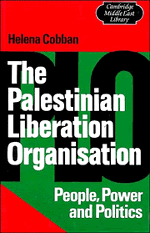Book contents
- Frontmatter
- Contents
- List of illustrations
- Preface
- Abbreviations
- Map 1 Palestine and the surrounding areas
- Introduction
- Part I History of the PLO mainstream
- Part II Internal relations
- 7 Non-Fateh guerrilla groups
- 8 The movement inside historic Palestine
- PART III External relations
- Conclusions
- Appendixes
- Notes
- References and select bibliography
7 - Non-Fateh guerrilla groups
Published online by Cambridge University Press: 26 January 2010
- Frontmatter
- Contents
- List of illustrations
- Preface
- Abbreviations
- Map 1 Palestine and the surrounding areas
- Introduction
- Part I History of the PLO mainstream
- Part II Internal relations
- 7 Non-Fateh guerrilla groups
- 8 The movement inside historic Palestine
- PART III External relations
- Conclusions
- Appendixes
- Notes
- References and select bibliography
Summary
The two years following the Arab states' June 1967 defeat formed, as we saw above in chapter 3, a decisive period for the Palestinian nationalist movement. It was the period when the idea of independent Palestinian guerrilla action met an explosion of support from Palestinian and non- Palestinian communities throughout the Arab world and when the fathers of that idea – the leaders of Fateh – were able to pull themselves up into the quasi-official status of controlling the PLO.
But the very dimensions of the new support expressed for the guerrilla idea in that period meant on the one hand that Fateh, with its longengrained habits of slow and careful underground work, was unable to absorb the scores of thousands of new guerrilla volunteers; and on the other, that all the pan-Arabist Arab regimes and parties were eager to stake out their own claim within the rapidly burgeoning guerrilla movement. Thus, the years 1967–69 also saw the growth of a spectrum of other Palestinian guerrilla organisations, which sometimes appeared to outside observers to be jostling with Fateh for overall control of the movement. In 1974, for example, four of the non-Fateh groups banded together in the Rejection Front1 to co-ordinate their opposition to the PLO/Fateh leaders' pursuit of a diplomatic settlement of the national cause.
In reality, though, Fateh's leadership of the movement was never seriously threatened either by the Rejection Front2 or by any of the other, earlier challenges Fateh had faced since it had consolidated its hold on the PLO in February 1969.
- Type
- Chapter
- Information
- The Palestinian Liberation OrganisationPeople, Power and Politics, pp. 139 - 167Publisher: Cambridge University PressPrint publication year: 1984
- 2
- Cited by



